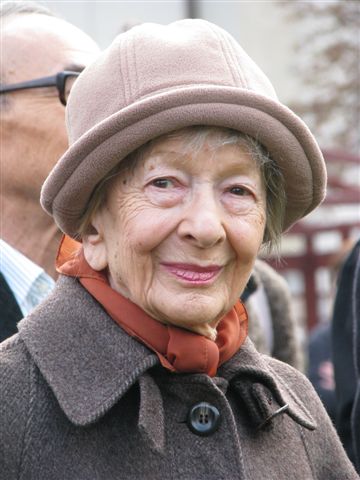Facts for Kids
Wisława Szymborska was a beloved Polish poet and essayist known for her playful yet thought-provoking writing.
Overview
Major Works
Literary Career
Themes And Style
Awards And Honors
Influence And Legacy
Political Involvement
Early Life And Education
Public Persona And Interviews
Translations And Collaborations

Inside this Article
Jagiellonian University
Reflection
Philosophy
Literature
Writing
Matter
Poland
Polish
Poetry
People
Did you know?
📝 Wisława Szymborska was a famous Polish poet born in 1923.
🌍 She won the Nobel Prize in Literature in 1996 for her wonderful poetry.
😄 Her poems often made people think and smile at the same time!
📚 Szymborska loved reading and studied literature at Jagiellonian University.
🚧 During World War II, she worked in a factory but never stopped dreaming of becoming a writer.
🌟 Her first collection of poems, 'Calling Out to Yeti,' was published in 1957.
💖 Throughout her life, she published over 30 poetry collections and essays!
📜 One of her famous poems is 'Nothing Twice,' which reflects on unique moments in life.
🎉 She often mixed humor with serious thoughts in her poetry, making it fun for readers of all ages.
🏆 Szymborska's work inspired many writers and continues to be taught in schools around the world.
Introduction
She was born in the city of Kórnik, Poland, and became one of the most important writers in the world. In 1996, she won the Nobel Prize in Literature, a fantastic honor. 🌍
Her poems talk about big ideas like life, love, and the universe, but she made them fun and easy to understand. Szymborska's playful style often made readers think and smile at the same time! 😄
She wrote many poems that people all over the world enjoy reading today.
Major Works
One popular poem is "The Woman and the Sea," where she explores the beauty and mystery of nature. Another famous piece is "Nothing Twice," which reminds us that life is full of unique moments. 🌊⭐ Her poetry often includes themes of discovery and reflection, making you think deeper about everyday life. Wisława has also written essays, including "The Art of Writing" and "View with a Grain of Sand," which inspire people to explore their creativity! 🎨
Her talents won the hearts of many readers and writers!
Literary Career
Her first collection of poems, "Calling Out to Yeti," arrived in 1957 and was very well-received. She became known for her unique voice and clever ideas. Throughout her life, Szymborska published over 30 poetry collections and essays! 💖
Her work captivated readers and earned her respect not just in Poland but around the world. She had a friendly relationship with her readers and shared her thoughts in newspapers. 😊
Wisława made poetry not just for scholars but for everyone!
Themes And Style
She often wrote about the simple joys of life, like nature and love. 🌺
Wisława had a unique style, mixing humor with serious thoughts, which made her work enjoyable for all ages. She liked to ask big questions, like "What does it mean to be human?" 🤔 Another theme in her poetry was the importance of living in the moment. Wisława often used everyday objects and situations to explore larger ideas, making her poetry relatable and fascinating! 🐦
Awards And Honors
The most famous is the Nobel Prize in Literature in 1996, which she earned for her unique style and deep ideas. 🌍
She was also awarded the Goethe Prize in 1991, celebrating her work's influence. Other honors include the Polish Literary Prize and the Herder Prize. 🎖
️ Wisława's achievements helped shine a light on Polish literature, showing children and adults that poems can be fun and meaningful. 💖
She became an inspiration for many young poets!
Influence And Legacy
Many writers and poets admire her work and often try to emulate her fun style. Her poems are translated into over 40 languages, allowing readers worldwide to enjoy them! 🌏
Wisława's ideas about life and humanity inspire art, literature, and even philosophy. Many schools teach her work, introducing students to the beauty of poetry. 🌟
Her legacy lives on in libraries, classrooms, and hearts, encouraging new generations to explore literature and think critically!
Political Involvement
️ Although she didn't join any political parties, she used her poetry to address social issues. Szymborska often defended individual freedom and democracy. 🛡
️ Her writings encouraged many people to think about their rights and the world they live in. She believed that poets could speak for those who couldn't and made a difference with her words! ✊
Early Life And Education
She was born on July 2, 1923, in a city called Kórnik. When she was young, the family moved to Kraków. There, Wisława went to school and loved reading. She even studied Polish literature and sociology at Jagiellonian University. 📖
Sadly, she had to stop her studies for a while because of World War II. During the war, she worked in a factory. 🚧
But she never stopped dreaming of becoming a writer! After the war, she returned to the university, where her love for poetry grew.
Public Persona And Interviews
She liked to discuss her work and share her thoughts but often felt shy about her fame. Wisława didn’t consider herself a celebrity; instead, she focused on her writing. 📖
In interviews, she would often joke, saying that she was simply “a poet in her little world.” 🌍 Szymborska enjoyed connecting with her readers, providing insight into her creative process. Many people admired how down-to-earth she was, making her even more relatable! 🥰
Translations And Collaborations
Thanks to translators, people worldwide can enjoy her work. Some famous translators include Clare Cavanagh and Stanisław Barańczak, who helped share her magic with others! ✨
Szymborska also collaborated with artists and musicians, further spreading her influence. Her poetry inspired beautiful artworks and songs, showing how her words reached beyond the page. 🎵
With translations and collaborations, Wisława's voice speaks to everyone—no matter the language they speak! 🗣
️

